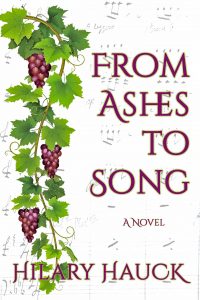Real Life & Fiction by Hilary Hauck
 When I was writing my debut historical novel, From Ashes to Song, I was intentional about borrowing from real life to create fiction. The deeper I went into the process, the more fascinated I became by the symbiotic relationship between fiction and real life. Though I have less (or no) control over what happens when the book reaches the hands of readers, I can only hope the story gives back to real life.
When I was writing my debut historical novel, From Ashes to Song, I was intentional about borrowing from real life to create fiction. The deeper I went into the process, the more fascinated I became by the symbiotic relationship between fiction and real life. Though I have less (or no) control over what happens when the book reaches the hands of readers, I can only hope the story gives back to real life.
I had been living in the US for about six years when I heard about Pietro, the man who first inspired From Ashes the Song. The timing was fortuitous. I had been playing with a couple of story ideas because I’d long ago set myself the task of writing a novel at around the wise, ‘old’ age of forty.
Pietro was a coal miner but he was also a gifted musician and composer, which I found to be an intriguing combination. I also felt an affinity with him because he had immigrated to the US from Italy a century before I did. I grew up in the UK, just outside of London, but had spent my twenties in Italy, in a town a short drive from Milan.
I’d landed in a rural coal town in Pennsylvania because of my husband’s work, a world away from anything I’d known and very different from the America I’d envisaged.
The thing that struck me the most was how this small town brimmed with nostalgia for the past. In its heyday, everyone here was an immigrant, and the locals still had a deep sense of history and where they came from. Everyone had a story.
I heard Pietro’s story from his daughter, Irene, who became a very dear friend. Pietro seemed to be a man of opposites. I could imagine him in the silence of the mine, his hands blistered, the breath he needed to play his clarinet ebbed away by the coal dust. Yet above ground, the exquisite way he played the polka was legendary. At dances, everyone would stop to listen, which seems to be the opposite of what you want people to do, though it’s testimony to his skill. And he was a composer. Rumor had it, he had even composed a symphony.
From a writing perspective, it soon became apparent that sewing real events together is far from straightforward. A string of interesting moments in a person’s life does not a novel make. Plus, I didn’t have all the facts laid out from Pietro’s life. There were many gaps in what we knew, including what motivated him to come to the US. Fortunately, Irene gave me free rein to fictionalize the story.
I imagined the character Pietro interpreting life around him through sound. For example, he describes the grape harvest at his family’s vineyard in Italy through sounds, never visuals. But this still wasn’t enough to drive an entire novel.
In Life of Pi, Yann Mantel writes, “That’s what fiction is about, isn’t it, the selective transforming of reality? The twisting of it to bring out the essence?” I needed to find the essence of Pietro’s story, and I found that essence in my own life.
Beyond the experience of being an immigrant, coming from Italy to the US, it seemed that Pietro and I shared the challenge of not knowing what to do with our creative calling that was always there, but just out of reach. For me, storytelling through words, for Pietro, through his music.
In fact, this was not my first attempt at writing a novel. I was always making up stories as a child, and in my teens I set out to become a novelist. Alas, I didn’t make it past the opening scene. My attempt failed because I told myself I didn’t know much of anything about the world I lived in, so how could I create an authentic world for my characters to inhabit? In other words, I told myself I wasn’t good enough and wouldn’t be until I was ‘old’ and wise. My teenage self saw that as being forty. For the record, my fifty-year-old self thinks forty is so young!
Similarly, Pietro had a deep itch that he couldn’t scratch because he couldn’t exactly identify what the itch was, and even when he got close, he didn’t have the courage to embrace it. What right did he, a coal miner, have to consider himself a composer?
The essence of the story therefore became Pietro’s need to slay his inner voice that told him he had no right. Only when he had slain that voice—with a few false starts—could he take charge, know he was worthy and able, and fully connect with his gift as a composer. I’d even go as far to say that Pietro and I traveled this path together.
I think some readers may be able to relate. I believe many of us suffer from imposter syndrome at some point and to some degree. Our own fears, our own inability to believe in ourselves hold us back from living our authentic selves.
And here is how fiction has the power to give back to real life. It is, for me, the most essential, the most powerful aspect of fiction. Fiction lets us in, it allows us a chance to decipher our experiences and it gives us knowledge and hope.
We gain insight from novels in a deeper way than we might realize. MRI studies show that when people read, they experience a response in the brain similar to a real-life experience. In a way, that astounds me. Then again, it explains why we are compelled to read. Oh, the lives we can lead!
Wherever we are in the world or in life, someone somewhere has experienced similar struggles to us. Recognizing our struggle in a story makes us feel less alone. It can show us a path forward and give us courage. Or where a character’s experiences are entirely foreign to us, we gain empathy from sharing their journey as they struggle with internal and external conflict. We learn that we have much more in common with others than stands between us.
Real people’s stories, in particular, show us what could be within our own reach. If an ordinary coal miner can do it, there’s nothing to say I can’t do it, too. Then again, I wholeheartedly believe that Pietro—and most of us, for that matter—are extraordinary in our own, unique ways.
So, as a writer, it’s my job to tell the best story I can. But then I have to stand back and let readers take from the story what they will. It’s beyond my control, but I do hope somebody somewhere will read Pietro’s story in From Ashes to Song and realize that they, too, can stop holding themselves back. That they don’t need to listen to their inner voice when it spews fear and tells us we cannot. That they, too, can write their own song. And that, I think, is what keeps me writing.
—
About the author:
 Hilary Hauck is the author of From Ashes to Song, her debut novel. A writer and translator, her work has appeared in the Mindful Writers Retreat Series anthologies, the Ekphrastic Review, Balloons Lit. Journal, and the Telepoem Booth. She moved to Italy from her native UK as a young adult, where she mastered the language, learned how to cook food she can no longer eat, and won a karate championship. After meeting her husband, Hilary came to the US and drew inspiration from Pennsylvania coal history, which soon became the setting for her debut novel. Hilary is Chair of the Festival of Books in the Alleghenies, past president of Pennwriters, and a graduate of RULE. She lives on a small patch of woods in rural Pennsylvania with her husband, one of their three adult children, a cat with a passion for laundry, and an oversized German Shepherd called Hobbes—of the Calvin variety. For more information, please visit https://www.hilaryhauck.com
Hilary Hauck is the author of From Ashes to Song, her debut novel. A writer and translator, her work has appeared in the Mindful Writers Retreat Series anthologies, the Ekphrastic Review, Balloons Lit. Journal, and the Telepoem Booth. She moved to Italy from her native UK as a young adult, where she mastered the language, learned how to cook food she can no longer eat, and won a karate championship. After meeting her husband, Hilary came to the US and drew inspiration from Pennsylvania coal history, which soon became the setting for her debut novel. Hilary is Chair of the Festival of Books in the Alleghenies, past president of Pennwriters, and a graduate of RULE. She lives on a small patch of woods in rural Pennsylvania with her husband, one of their three adult children, a cat with a passion for laundry, and an oversized German Shepherd called Hobbes—of the Calvin variety. For more information, please visit https://www.hilaryhauck.com
Category: Contemporary Women Writers, How To and Tips
























